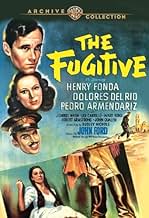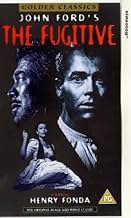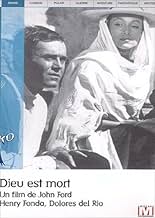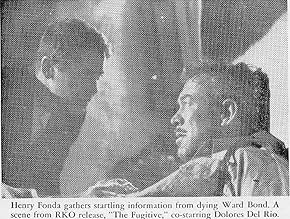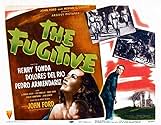AVALIAÇÃO DA IMDb
6,3/10
2,7 mil
SUA AVALIAÇÃO
Adicionar um enredo no seu idiomaAnti-Catholic and anti-cleric policies in the Mexican state of Tabasco lead the revolutionary government to persecute the state's last remaining priest.Anti-Catholic and anti-cleric policies in the Mexican state of Tabasco lead the revolutionary government to persecute the state's last remaining priest.Anti-Catholic and anti-cleric policies in the Mexican state of Tabasco lead the revolutionary government to persecute the state's last remaining priest.
- Direção
- Roteiristas
- Artistas
- Prêmios
- 1 vitória e 2 indicações no total
Dolores Del Río
- An Indian Woman
- (as Dolores Del Rio)
Pedro Armendáriz
- A Lieutenant of Police
- (as Pedro Armendariz)
Chris-Pin Martin
- An Organ-Grinder
- (as Cris-Pin Martin)
Miguel Inclán
- A Hostage
- (as Miguel Inclan)
Fernando Fernández
- A Singer
- (as Fernando Fernandez)
Rodolfo Acosta
- Policeman
- (não creditado)
Mel Ferrer
- Father Serra
- (não creditado)
Jack Pennick
- Man
- (não creditado)
José Torvay
- Mexican
- (não creditado)
- Direção
- Roteiristas
- Elenco e equipe completos
- Produção, bilheteria e muito mais no IMDbPro
Avaliações em destaque
When Herbert J. Yates of Republic Pictures made a deal with John Ford to produce The Quiet Man he first made Ford agree to do one of his cavalry epics with John Wayne because he wanted a surefire moneymaker before taking a chance on The Quiet Man. The cavalry picture was Rio Grande.
He must have been talking to the folks at RKO who lost their collective shirts when the public stayed away in droves from The Fugitive. It got great critical acclaim and no box office at all.
My guess is that The Fugitive was sold all wrong or was made a year or two too early. If it had been sold as an anti-Communist as opposed to a pro-Catholic film it might have done better in those beginning years of The Cold War.
The Fugitive is based on a Graham Greene novel The Power and the Glory and it is about a priest in an unnamed South American country who is a fugitive because of his calling. An anti-clerical government has taken control of the country and they are doing their best to drive the Catholic religion out of the country.
Henry Fonda turns in a good sincere performance as the cleric, but he's about as convincingly Latino as Toshiro Mifune. The other members of the cast are well suited for their roles.
The best performance in the film is from that chameleon like actor J. Carrol Naish who could play any kind of nationality on the planet. He's the informer who rats out Henry Fonda to the police. Very similar to what Akim Tamiroff did to Gary Cooper in For Whom The Bells Toll and Naish's own performance in another Gary Cooper film, Beau Geste.
This was the first of three films Pedro Armendariz did with John Ford in an effort to broaden his appeal beyond Mexican cinema. Dolores Del Rio as his estranged wife was already familiar to American audiences from the silent screen.
The original novel by Greene had the priest as somewhat less than true to all his vows. He's a drinker and a womanizer. Del Rio's character is also quite tawdry. And this from Greene who was a well known Catholic lay person. But this Hollywood in the firm grip of The Code so a lot of what Greene wrote had to be softened by Ford for the screen. It lessened the impact of the film.
And with the whitewashing of Fonda's character came some rather heavy handed symbolism of Fonda as a Christlike figure.
Still The Fugitive might be worth a look for Ford, Greene, and Fonda fans.
He must have been talking to the folks at RKO who lost their collective shirts when the public stayed away in droves from The Fugitive. It got great critical acclaim and no box office at all.
My guess is that The Fugitive was sold all wrong or was made a year or two too early. If it had been sold as an anti-Communist as opposed to a pro-Catholic film it might have done better in those beginning years of The Cold War.
The Fugitive is based on a Graham Greene novel The Power and the Glory and it is about a priest in an unnamed South American country who is a fugitive because of his calling. An anti-clerical government has taken control of the country and they are doing their best to drive the Catholic religion out of the country.
Henry Fonda turns in a good sincere performance as the cleric, but he's about as convincingly Latino as Toshiro Mifune. The other members of the cast are well suited for their roles.
The best performance in the film is from that chameleon like actor J. Carrol Naish who could play any kind of nationality on the planet. He's the informer who rats out Henry Fonda to the police. Very similar to what Akim Tamiroff did to Gary Cooper in For Whom The Bells Toll and Naish's own performance in another Gary Cooper film, Beau Geste.
This was the first of three films Pedro Armendariz did with John Ford in an effort to broaden his appeal beyond Mexican cinema. Dolores Del Rio as his estranged wife was already familiar to American audiences from the silent screen.
The original novel by Greene had the priest as somewhat less than true to all his vows. He's a drinker and a womanizer. Del Rio's character is also quite tawdry. And this from Greene who was a well known Catholic lay person. But this Hollywood in the firm grip of The Code so a lot of what Greene wrote had to be softened by Ford for the screen. It lessened the impact of the film.
And with the whitewashing of Fonda's character came some rather heavy handed symbolism of Fonda as a Christlike figure.
Still The Fugitive might be worth a look for Ford, Greene, and Fonda fans.
Fugitive, The (1947)
*** (out of 4)
Henry Fonda plays a priest in Central America who finds himself on the run after the government bans all religion. Fonda manages to go from town to town with religious folks willing to protect him but soon he runs into a crooked police informer (J. Carrol Naish) who might be giving information to the Lieutenant (Pedro Armendariz) who will stop at nothing to clear the streets of the evil religious figures. This film was a notorious flop when it was released and I'm fairly positive it would flap in any year in any decade. That's not because it's a bad film because it isn't but the film is so depressing that you can't help but feel most people wouldn't want to sit through it. The film contains some absolutely breath-taking cinematography by Gabriel Figueroa, which ranks as some of the best I've seen from this era. If you think the noir genre was good at using shadows and darkness then you haven't seen anything yet. As I said, this movie is 100% depression and what really fits the mood is the cinematography because it paints the perfect atmosphere. There are countless memorable scenes including the final shot with a cross as well as an earlier one where Fonda is hiding in a church and many parents from the village come in to get their children baptized while they have the chance. Another major plus working for the film is Ford's direction, which is top-notch as usual. I'm really not sure why this film would appeal to him but it's always amazing to go through Ford's career and see how many times he would direct something outside his range and pull it off. Ford does a terrific job building up this sad atmosphere and I really enjoyed the fact that he didn't pull any punches by adding fake comedy or just trying to lighten up the mood. Then, of course, there's Fonda who once again delivers the goods. The way Fonda walks here makes it seem as if he's a feather blowing in the wind because he's obviously a weak man who is struggling with being hunted. I thought the actor did a tremendous job showing the frailty of the character and the inner struggles he's having with the religion. Naish made a career out of playing snakes and once again he delivers an excellent performance and I'm sure by the end you'll be wanting to kill this guy yourself. Dolores del Rio plays a disgraced woman who is befriended by the priest and is excellent as well. Leo Carrillo, Ward Bond and Robert Armstrong add nice support as well. It's Armendariz who steals the show however as the truly tortured soul who is fighting to keep the religion out of his streets but is doing so due to some secret issues. THE FUGITIVE has all the right elements but it's still lacking something. Perhaps the film is just too laid-back for its own good but it never really crosses the greatness mark.
*** (out of 4)
Henry Fonda plays a priest in Central America who finds himself on the run after the government bans all religion. Fonda manages to go from town to town with religious folks willing to protect him but soon he runs into a crooked police informer (J. Carrol Naish) who might be giving information to the Lieutenant (Pedro Armendariz) who will stop at nothing to clear the streets of the evil religious figures. This film was a notorious flop when it was released and I'm fairly positive it would flap in any year in any decade. That's not because it's a bad film because it isn't but the film is so depressing that you can't help but feel most people wouldn't want to sit through it. The film contains some absolutely breath-taking cinematography by Gabriel Figueroa, which ranks as some of the best I've seen from this era. If you think the noir genre was good at using shadows and darkness then you haven't seen anything yet. As I said, this movie is 100% depression and what really fits the mood is the cinematography because it paints the perfect atmosphere. There are countless memorable scenes including the final shot with a cross as well as an earlier one where Fonda is hiding in a church and many parents from the village come in to get their children baptized while they have the chance. Another major plus working for the film is Ford's direction, which is top-notch as usual. I'm really not sure why this film would appeal to him but it's always amazing to go through Ford's career and see how many times he would direct something outside his range and pull it off. Ford does a terrific job building up this sad atmosphere and I really enjoyed the fact that he didn't pull any punches by adding fake comedy or just trying to lighten up the mood. Then, of course, there's Fonda who once again delivers the goods. The way Fonda walks here makes it seem as if he's a feather blowing in the wind because he's obviously a weak man who is struggling with being hunted. I thought the actor did a tremendous job showing the frailty of the character and the inner struggles he's having with the religion. Naish made a career out of playing snakes and once again he delivers an excellent performance and I'm sure by the end you'll be wanting to kill this guy yourself. Dolores del Rio plays a disgraced woman who is befriended by the priest and is excellent as well. Leo Carrillo, Ward Bond and Robert Armstrong add nice support as well. It's Armendariz who steals the show however as the truly tortured soul who is fighting to keep the religion out of his streets but is doing so due to some secret issues. THE FUGITIVE has all the right elements but it's still lacking something. Perhaps the film is just too laid-back for its own good but it never really crosses the greatness mark.
I was attracted to this movie because of Henry Fonday, Dolores del Rio, and John Ford, all of whom I'm a fan. But this movie was just so WEIRD. From the start, I felt like I had joined the movie in the middle. The dramatic music along the walk and as he enters the church - it feels like a crucial point in a movie, but we don't even know what's going on yet. There are long periods with no dialogue, almost has the feel of a silent movie at times.
I found the whole movie depressing without any redeeming character development that would have made me sympathize with the characters. Why is Fonda, a white priest, even in this country in the first place? It's never explained. And he lets everyone take the fall for him. He's not likable or relatable in any way to me.
I found the whole movie depressing without any redeeming character development that would have made me sympathize with the characters. Why is Fonda, a white priest, even in this country in the first place? It's never explained. And he lets everyone take the fall for him. He's not likable or relatable in any way to me.
It's been written somewhere that the cruelest thing you can say to an artist is that his work is flawless. John Ford thought of the Fugitive as, despite not being a box-office success, a perfect film and one of his very favorites. It's perhaps more than prudent then to point out some of the criticisms one would have of the film (which, perhaps, is moot since he's been dead for decades). As a fan of the Ford work I've seen there are some times when he's touched perfection (Grapes of Wrath and the Searchers are it for me), and sometimes not so much, which goes without saying he directed many films. With the Fugitive it's recognizable to me why it's split its audience: some hail it as being totally underrated and a brilliant depiction of religious allegory and suffering, and some say that it's a total crock for being far too heavy-handed and acted over-the-top.
Both sides have their right points; it is an underrated picture, if only for its technical feats of cinematography (Gabriel Figueroa is just right for this kind of material for Ford) and Ford's usual talents as a basic storyteller with a tendency for pure cinema expression (i.e. lack of dialog is a plus with the emotion expressed through the camera and actors. But it is also not well-acted in a couple of instances, notably the beautiful but overbearing Delores Del-Rio as the woman living in the town who's baby is baptized by the Priest played by Henry Fonda. For Fonda, it should be said, he at least gives all he can for a performance that possibly other actors could have played with more magnificence. In fact it's for him that some of the picture is most watchable, as he flexes his emotional chops for a scene where it's required for complexity like when he misses the boat and is asked to bless someone dying only to realize there is no wine and must go to ask from a vulgarian for wine (which, as it turns out, is drunken with brandy and all by him).
While it might not be the Fonda we all know and love from Grapes of Wrath or My Darling Clementine he does what he can with the part, and it's a tribute to him and Ford that they make it engrossing on a very simple level that carries some complex connotations. When focusing on the actual chase and flight from the Mexican police it works very well (particularly with a hammy but effective informer played by J. Carrol Nash). It's just when Ford over-indulges in the spiritual aspect of the picture, which is only made clearer towards the end, that it loses its footing. Indeed the start of the picture kind of threw me off for a little bit as Fonda comes in with the Christ-like symbolism highlighted on the wall, and the townspeople come in with tears in their eyes and a somber song to sing and Fonda blesses and baptizes others. I wondered: is this a little TOO much in the way of what Ford does best, which is telling the story? He can be brilliant in throwing in his deep-rooted Catholic ideas as pure visions on the screen, and once or twice in the Fugitive he does... and then other times it falls flat or goes too high where it starts to become a full-blown religious picture as opposed to a societal thriller.
Should Ford fans see it? Of course; even a lessor Ford picture will have something interesting. Will everyone like it? Surely not. Yet it is usually fine, traditional work and shouldn't be completely dismissed.
Both sides have their right points; it is an underrated picture, if only for its technical feats of cinematography (Gabriel Figueroa is just right for this kind of material for Ford) and Ford's usual talents as a basic storyteller with a tendency for pure cinema expression (i.e. lack of dialog is a plus with the emotion expressed through the camera and actors. But it is also not well-acted in a couple of instances, notably the beautiful but overbearing Delores Del-Rio as the woman living in the town who's baby is baptized by the Priest played by Henry Fonda. For Fonda, it should be said, he at least gives all he can for a performance that possibly other actors could have played with more magnificence. In fact it's for him that some of the picture is most watchable, as he flexes his emotional chops for a scene where it's required for complexity like when he misses the boat and is asked to bless someone dying only to realize there is no wine and must go to ask from a vulgarian for wine (which, as it turns out, is drunken with brandy and all by him).
While it might not be the Fonda we all know and love from Grapes of Wrath or My Darling Clementine he does what he can with the part, and it's a tribute to him and Ford that they make it engrossing on a very simple level that carries some complex connotations. When focusing on the actual chase and flight from the Mexican police it works very well (particularly with a hammy but effective informer played by J. Carrol Nash). It's just when Ford over-indulges in the spiritual aspect of the picture, which is only made clearer towards the end, that it loses its footing. Indeed the start of the picture kind of threw me off for a little bit as Fonda comes in with the Christ-like symbolism highlighted on the wall, and the townspeople come in with tears in their eyes and a somber song to sing and Fonda blesses and baptizes others. I wondered: is this a little TOO much in the way of what Ford does best, which is telling the story? He can be brilliant in throwing in his deep-rooted Catholic ideas as pure visions on the screen, and once or twice in the Fugitive he does... and then other times it falls flat or goes too high where it starts to become a full-blown religious picture as opposed to a societal thriller.
Should Ford fans see it? Of course; even a lessor Ford picture will have something interesting. Will everyone like it? Surely not. Yet it is usually fine, traditional work and shouldn't be completely dismissed.
John Ford's adaptation of Graham Greene's "The Power And The Glory" captures perfectly the potential for the seven deadly sins in all of us. It is an incredibly and understatedly raw and emotional and downright earthy movie. The entire supporting cast is brilliant, and Fonda, of course, is excellent, if not precisely ideal. This is in all senses, a quintessential study in soul-searching.
Você sabia?
- CuriosidadesThe opening narration is by Ward Bond, who also plays an important role in the film.
- Erros de gravaçãoWhen the Priest is on line getting ready to board a ship, he is approached by a young boy that was baptized by him. The boy informs him that his mother is dying and wishes for the priest to come home with him to give her the last rites. What is not explained is how did the boy just happen to know that the priest was in town and getting ready to board a ship at that precise moment and in the third class section.
- Citações
A Lieutenant of Police: [Looking at news clipping] You can tell he's a priest by the collar, that's all.
A Chief of Police: Not a very good picture, but it's what we got.
A Lieutenant of Police: They all look alike to me. I've shot him a dozen times.
- Trilhas sonorasBury Me Not on the Lone Prairie
("The Dying Cowboy") (uncredited)
American folk ballad based on an older sea song (1932)
Variation heard as theme for the Gringo (Ward Bond)
Principais escolhas
Faça login para avaliar e ver a lista de recomendações personalizadas
- How long is The Fugitive?Fornecido pela Alexa
Detalhes
Bilheteria
- Orçamento
- US$ 1.500.000 (estimativa)
- Tempo de duração1 hora 44 minutos
- Cor
- Proporção
- 1.37 : 1
Contribua para esta página
Sugerir uma alteração ou adicionar conteúdo ausente

Principal brecha
By what name was Domínio dos Bárbaros (1947) officially released in India in English?
Responda
